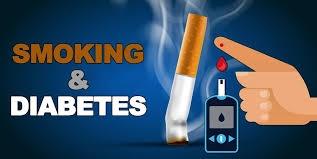Smoking and Diabetes
If you smoke, you’re more likely to get type 2 diabetes (T2D). In fact, your chances go up by 30%-40% when compared to someone who doesn’t smoke. If you already have diabetes, smoking can make it harder to control your blood sugar. It can also worsen other health problems.
One of the best things you can do for your health is to give up smoking. But it can be hard to stop on your own. That’s why it’s important to get support from friends, family, or online communities. You should also bring it up with your doctor. They have treatments that can help you quit.
How Can Smoking Lead to Diabetes?
Studies show nicotine, the active chemical in cigarettes, can raise your blood sugar. It can also hurt your body in many diabetes-related ways. You may get:
• Insulin resistance. Nicotine makes it harder for your cells to respond to insulin. That’s the hormone that helps your body use the sugar in your blood. You’ll end up with higher glucose levels.
• Inflammation. Chemicals in cigarettes hurt your cells. This can lead to inflammation. That’s when your body tries to heal itself. This kind of damage makes it harder for your body to use insulin the right way.
• Belly fat. If you’re a heavy smoker, you may gain more weight around your midsection. Even if you’re not overweight, this central fat can raise your chances of insulin resistance and T2D.
• Other health problems. Your “bad” LDL cholesterol can go up. At the same time, your “good” HDL cholesterol goes down. Smoking also raises your triglycerides. Those are a kind of fat found in your blood. High cholesterol and triglycerides have a link to T2D.
Smoking if You Have Diabetes
Nicotine makes it harder to control your blood sugar. If you use insulin, you may need to take more of it than someone who doesn’t smoke. Smoking paired with unmanaged diabetes can also speed up damage to your whole body. That’s because your big and little blood vessels get hurt.
Compared to someone with diabetes who doesn’t smoke, you’ll have an even greater chance of:
• Heart disease
• Eye problems
• Stroke
• Kidney failure
• Nerve damage (neuropathy)
• Erectile dysfunction
Smoking and Sleep
Studies show smokers don’t get as much quality sleep. There’s a link between a lack of this restorative deep sleep and T2D. Part of the problem is that nicotine is a stimulant. That means it can keep you awake. But you may also have sleep problems as the chemicals leave your body at night. That’s called withdrawal.
On the flip side, you may find it hard to fall or stay asleep when you first quit smoking. If that happens to you, talk to your doctor. They can help you find ways to get a good night’s rest.
Does Smoking Cause Diabetes?
There’s a really strong connection between cigarette smoking and T2D. Many studies point to a cause-effect relationship. But some experts believe that it’s hard to say for sure that smoking alone causes diabetes. That’s because there are a lot of other things at play.
Some other drivers of T2D include:
• Stress
• Obesity
• A family history of diabetes
• A lack of exercise
• Health problems, like high blood pressure
Quitting Can Help
Your blood sugar may go up when you first stop smoking. This might happen because of post-quit weight gain. But experts aren’t sure if added pounds are totally to blame. Either way, you should stick with it. The longer you go without cigarettes, the better your insulin resistance will get.
If you don’t already have T2D, you may be more likely to get it when you first stop smoking. Your chances are highest the first 2 years after you quit. But if you abstain for 10-12 years, your chances are more like someone who’s never smoked.
If you’re finding it hard to quit, talk to your health care team. Your doctor may suggest a mix of treatment. That might include:
• Counseling
• Nicotine replacement therapy
• Mindfulness training for smoking cessation (MTS)
• Antidepressant (bupropion)
• Chantix, an oral medication that blocks nicotine receptors and eases symptoms of withdrawal
• Treatments for insomnia
